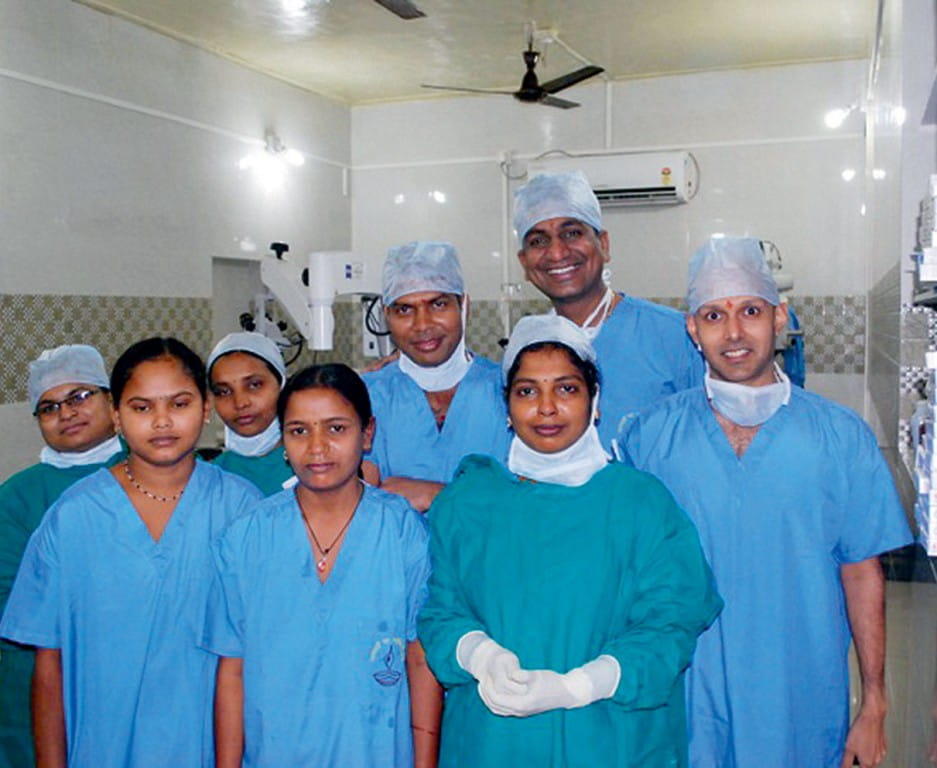Stories > Lighting Up Lives
Lighting Up Lives
Singapore-based non-profit organisation The Vision Mission works with groups around Asia to restore sight to some of the most needy ophthalmic patients in the region. BY SASHA GONZALES
PHOTOS THE VISION MISSION
hen three friends – Indian entrepreneur Avinash Jayaraman and Singaporean ophthalmologists Dr Jayant V Iyer and Dr Jason Lee – started The Vision Mission in 2014, they had a dream of eradicating treatable eye conditions in South-east and South Asia and facilitating eye care access to those in need.
But it is not simply free eye care that they want to provide. Instead, the founders hope to equip regional eye-care providers with the relevant knowledge, skills and expertise to independently operate a self-sustainable eye-care programme with international best practices.
To achieve this objective, it looks for partnership opportunities with local organisations where the need is greatest. These are usually places where a high proportion of the local population live under difficult socio-economic circumstances and where a functioning ophthalmic set-up faces a shortage of local ophthalmologists.
Dr Iyer says that the Singapore-based non-profit organisation (NPO) also looks for local eye-care experts who are willing to work with international teams, and who are keen on expanding the reach of their local set-up to provide high-quality general and sub-specialty ophthalmic care to the needy in the region.

An elderly patient undergoing eye examination; Dr Shiva Prasad Sahoo (left) of Trilochan Netralaya performing cataract surgery on a patient; A patient pre-surgery.
Only in its second year, the NPO already has several programmes running on the ground. Its flagship initiative, Project Netra (netra means “eye” in Sanskrit), is based in Odisha in eastern India. With a large rural and tribal population, Odisha is one of India’s poorest states, and access to good eye care is limited.
The Vision Mission collaborated with Trilochan Netralaya, an Indian non-governmental organisation in Odisha that aims to restore sight to those with treatable eye conditions. In 2014, the NPO funded and conducted 1,000 free cataract surgical operations in Odisha over three separate trips. It has committed to organising 1,000 cataract surgical operations every year as part of the project.
Says Dr Iyer: “On a typical week-long mission trip, we send a team of two to three ophthalmologists and one non-medical volunteer. This team collaborates with the local team of ophthalmologists and nurses to achieve a predetermined target in terms of running clinics, conducting cataract surgery and training.”
The NPO chose India to kick off its programme because the country’s need for quality eye care is acute. According to the World Health Organization, 20 per cent of the world’s 39 million blind people live in India.
SUSTAINABLE SOLUTIONS
Beyond surgery, the NPO has also drafted a plan to raise Trilochan Netralaya’s expertise levels substantially, developing it from being an organisation that primarily treats cataracts to one with a more comprehensive ophthalmic set-up capable of running a programme for diabetic retinopathy – a disorder of the blood vessels in the retinas of diabetic patients.
It also hopes to get Trilochan Netralaya to run general ophthalmology clinics and provide subspecialty expertise in glaucoma. Dr Iyer says that these eye conditions are specifically chosen as they afflict many of Odisha’s people.
To this end, The Vision Mission has established a Continuing Medical Education platform, which enables local doctors and international ophthalmologists to share knowledge and experience. It sends teams of volunteers regularly to train local doctors in the use of therapeutic laser for the management of diabetic retinopathy.

The medical team from Trilochan Netralaya with volunteer doctors from The Vision Mission.
KEY FACTS ON VISUAL IMPAIRMENT
285 million people are estimated to be visually impaired worldwide. Of these, 39 million are blind and 246 million have moderate to severe visual impairment.
About 90 per cent of those with visual impairment live in developing countries.
80 per cent of all visual impairment can be prevented or cured.
82 per cent of people living with blindness are aged 50 and above.
Cataracts are the leading cause of blindness in middle- and low-income countries.
(SOURCE: WORLD HEALTH ORGANIZATION.)
Says Dr Iyer: “For Project Netra, we send a three-member team thrice a year to augment the clinical set-up at our partner institute. Our idea is to bring in sub-specialty expertise, training and funding to local doctors serving these remote areas, such that we can upgrade their set-ups to function as tertiary centres for those regions.”
The NPO has also revamped the existing systems in operating theatres and clinics to ensure that international best practices are adhered to, and set up a tele-ophthalmology service that will allow local eye doctors to consult directly with international ophthalmologists on any challenging cases encountered in their work.
Dr Iyer says it hopes to leave behind a self-sustainable eye-care centre that meets international standards and addresses the local population’s needs by 2019. Meanwhile, the NPO is looking to replicate the model set up through Project Netra in Bihar, another state in eastern India, in the near future. It will also be a collaborative effort with a like-minded local organisation, he adds.
The NPO is also active in northeastern Sri Lanka, a region that has limited medical care due to decades of conflict, where it has set up optometry programmes to improve sight among the needy. A few of its volunteer doctors have also been involved in humanitarian programmes in Myanmar, providing eye care for the needy in various areas, and it is looking into the possibility of partnering a local institute to replicate some of its efforts in Project Netra.
Dr Iyer hopes that The Vision Mission will help to raise overall eye-care standards for needy communities in the region over the long term.
